|
|
|
 |
|
"AND when Abram heard that his
kinsman was taken captive,
he led forth
his 318 trained men…and pursued as far as Dan”
GENESIS 14
|
|
|
 |
|
 |
| |
Abra(ha)m’s
nephew Lot, the only virtuous resident in
the city of Sodom, had the dubious
distinction of being the world’s first
recorded hostage. During a classic
Middle Eastern squabble between the
chieftains of the cities around the Dead
Sea, Lot was seized as a way of testing
Abram’s strength. Abram chased the
culprits as far as Dan in the north, nearly
200 miles from Sodom. With 318 of his
servants or soldiers, Abram crushed them at
Hobah, north of Damascus. He freed his
nephew and recovered Lot’s possessions
before he went south to Jerusalem to meet
Melchizedek, king of Salem.
This passage in Genesis 14 indicates that
Abram may have spent some time at Dan, which
was actually called Laish during the
patriarchal period. Only some seven
centuries later, when the tribe of Dan
conquered Laish, did they rename it after
“Dan their father who was born to Israel
[Jacob] although the name of the city was
Laish at first.” (Judges 18:29)
|
|
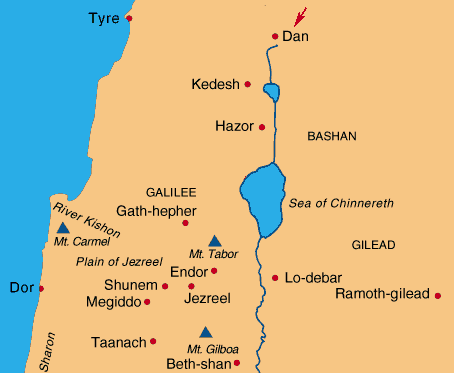 |
|
Adapted from map on Internet
for Learning site |
|
Map of northern Israel
showing Dan on the northern boundary |
|
|
When the
excavator of Dan, Abraham Biran, who died in
2008, one month short of his 99th birthday,
would speak about Israel’s longest running
archeological dig – from 1966 to the end of
the 20th century – he would title his
lecture “A Tale of Two Cities.” In the
lecture, Biran would tell the story of the
discovery of one of his most spectacular
finds -- a triple-arched mud-brick gate,
dating from the Middle Bronze Age, 19th to
18th centuries B.C.
It was on the very last day of the season in
1979, as the excavators removed earth
covering a mud-brick wall or tower, that the
beginnings of an arch appeared. Biran
was dumb-founded. He asked himself,
“How could there possibly be an arch when we
learned at school that the arch is a Roman
invention? We are excavating a city
antedating by 2,000 years, Roman occupation
of our region. Yet, here in ancient
Laish, an arch having a span of seven feet
was constructed of sunbaked mud-brick!”
Biran wrote that they had to restrain their
curiosity as it what it was, for a whole
year until the next digging season.
When they returned the summer of 1980, their
strategy was, “Follow the mud-bricks.”
To their astonishment, a gate complex with
two towers flanking a recessed arched
gateway was revealed. Biran estimated
that the mud-brick towers, preserved to
nearly twenty feet, were almost at their
original height. |
| |
|
 |
|
Photo:
Gila Yudkin |
|
18th century B.C.
mud-brick gate at Tel Dan discovered in 1979 |
|
|
| Several
times I heard Biran say in lectures that he
couldn’t imagine the king of 18th century
Laish not going out to greet Abraham and
inviting him into his city. Laish was
relatively large in area, and very well
fortified. If so, then Abraham may
have entered through that very gate. |
| |
|
 |
|
Photo:
Gila Yudkin |
|
Listening to Genesis 14:
the story of Abraham's chase by Dan's
mud-brick gate |
|
|
When I
studied to be a guide in 1977, the
triple-arched gate hadn’t yet been
discovered. As I began to tour Dan
with my groups, I witnessed the painstaking
removal of dirt from the northern side of
the arch, while the archeologists constantly
took precautions to minimize the danger of
collapse. I often saw Biran on site
and he graciously answered my questions
(even the dumb ones!) and always posed for a
photo with my pilgrims.
In the beginning before the path was beaten
out, the mud-brick gate was difficult to
find. (More than once I was presented with a
compass to gales of laughter at the final
dinner, because I had gotten lost at Dan!)
Today, however, after two and a half decades
of guiding at Dan, I can easily find
“Abraham’s Gate.”
|
|
 |
|
Photo:
Pastor Mike Clark |
|
Gila's geography briefing
before setting out for "Abraham's Gate" |
| |
| |
| On your next
pilgrimage, if you allow enough time at Dan
(because there’s lots more to see and
experience -- like the Dan springs, the high
altar for the golden calf, Ahab's city gates
and the pistachio tree lookout), I’d be
happy to lead you to this spectacular find
from the time of Abraham. |
| |
|
 |
|
Photo:
Rev. Darrell Mount |
|
At Dan with the Israel-Lebanon border
behind Gila |
|
|
|
Gila Yudkin,
who calls herself a Connecticut-born Yankee
living now in King David's court, has been
shepherding pilgrims in the Holy Land for
over a quarter of a century. She hasn’t yet
lost one stray – at least not permanently!
It’s recommended you contact Gila while you
are planning your pilgrimage to ensure that
your itinerary is feasible, inspiring and
allows for biblical adventures. |
| |
|
More
Biblical Archeology: |
| |
|
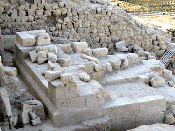 |
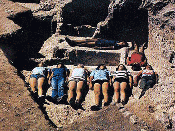 |
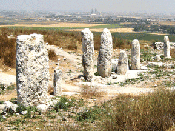 |
|
Herod's Tomb |
Priestly benediction |
Gezer & Solomon's dowry |
| |
|
|
|
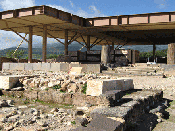 |
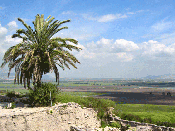 |
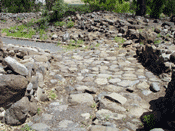 |
|
Joshua at Hazor |
Megiddo / Armageddon |
Bethsaida |
| |
|
|
Follow Abraham to the Negev where he travels
on his way to and from Egypt in
“Let’s
wander in the wilderness of Zin.” |
| |
|
Copyright 2008, 2012 Gila Yudkin. Permission
needed for any reuse. |
|
|
|
GILA
YUDKIN
•
TCHERNIKOVSKI
64A
•
JERUSALEM
•
ISRAEL
gila@itsgila.com
HOME
•
BOOK
GILA
• TIPS
FOR TOURS •
ABOUT GILA
|
|

